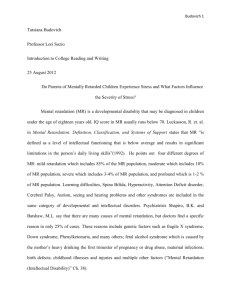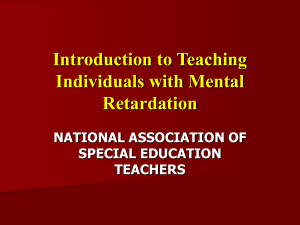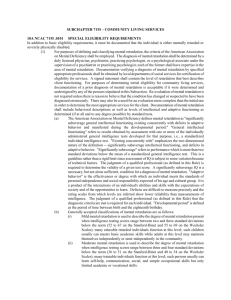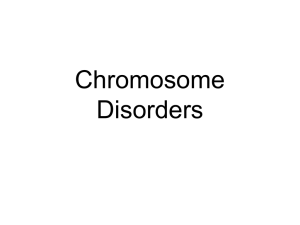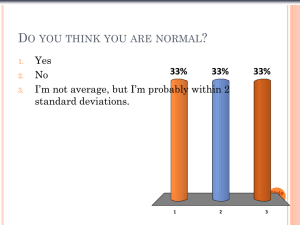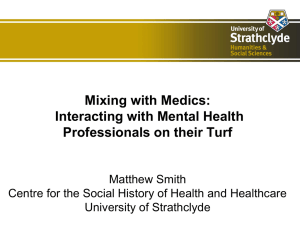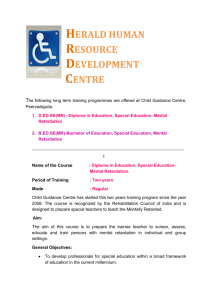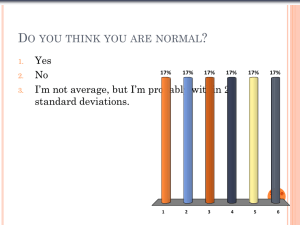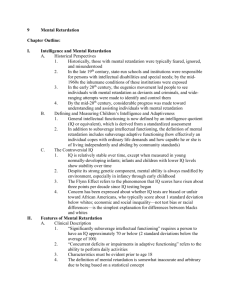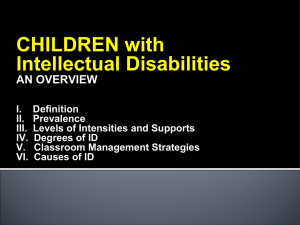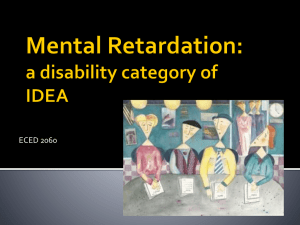Mental Retardation
advertisement
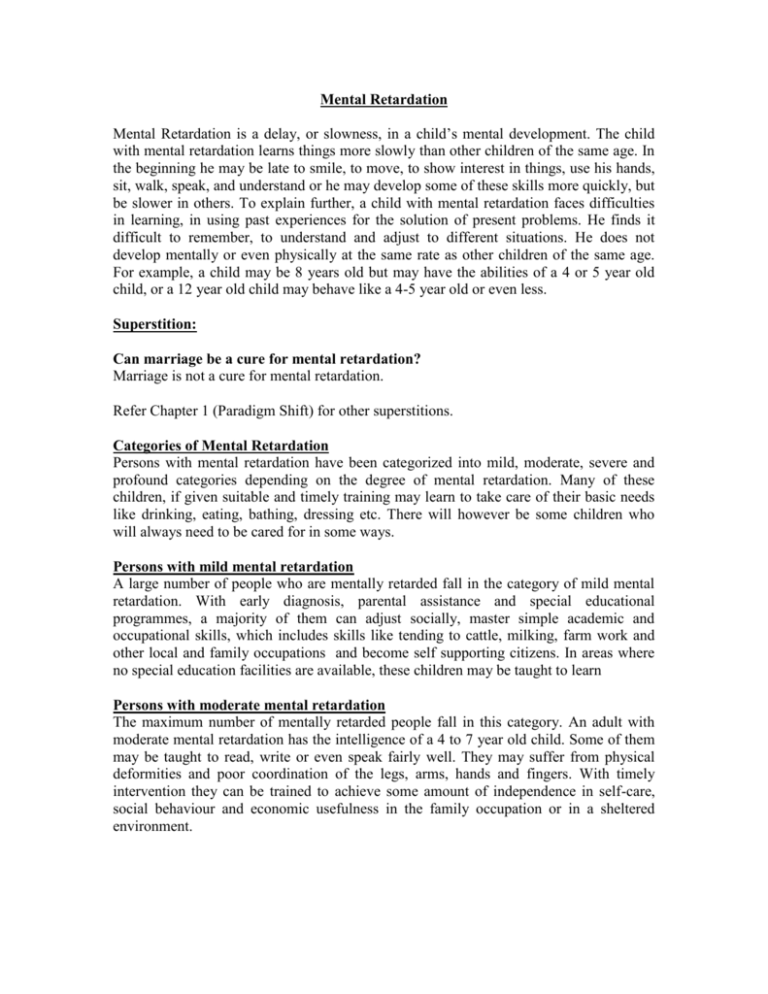
Mental Retardation Mental Retardation is a delay, or slowness, in a child’s mental development. The child with mental retardation learns things more slowly than other children of the same age. In the beginning he may be late to smile, to move, to show interest in things, use his hands, sit, walk, speak, and understand or he may develop some of these skills more quickly, but be slower in others. To explain further, a child with mental retardation faces difficulties in learning, in using past experiences for the solution of present problems. He finds it difficult to remember, to understand and adjust to different situations. He does not develop mentally or even physically at the same rate as other children of the same age. For example, a child may be 8 years old but may have the abilities of a 4 or 5 year old child, or a 12 year old child may behave like a 4-5 year old or even less. Superstition: Can marriage be a cure for mental retardation? Marriage is not a cure for mental retardation. Refer Chapter 1 (Paradigm Shift) for other superstitions. Categories of Mental Retardation Persons with mental retardation have been categorized into mild, moderate, severe and profound categories depending on the degree of mental retardation. Many of these children, if given suitable and timely training may learn to take care of their basic needs like drinking, eating, bathing, dressing etc. There will however be some children who will always need to be cared for in some ways. Persons with mild mental retardation A large number of people who are mentally retarded fall in the category of mild mental retardation. With early diagnosis, parental assistance and special educational programmes, a majority of them can adjust socially, master simple academic and occupational skills, which includes skills like tending to cattle, milking, farm work and other local and family occupations and become self supporting citizens. In areas where no special education facilities are available, these children may be taught to learn Persons with moderate mental retardation The maximum number of mentally retarded people fall in this category. An adult with moderate mental retardation has the intelligence of a 4 to 7 year old child. Some of them may be taught to read, write or even speak fairly well. They may suffer from physical deformities and poor coordination of the legs, arms, hands and fingers. With timely intervention they can be trained to achieve some amount of independence in self-care, social behaviour and economic usefulness in the family occupation or in a sheltered environment. Persons with severe mental retardation In a person with severe mental retardation, speech and movements of the arms and legs are severely affected and sensory difficulties are common. They can develop limited levels of personal hygiene and self help skills. But they require supervision in managing simple skills. Some of them can be trained in simple repetitive tasks. Persons with profound mental retardation Persons with profound mental retardation can learn only the simplest of tasks with great difficulty. Speech is at a basic rudimentary level. Severe physical deformities, retarded growth, speech difficulties, visual problems, deafness, fits and other physical problems are quite common. Their resistance to disease may be very low and their life expectancy may be short. However, there is improvement in the child’s health condition with latest treatment methods. People with profound mental retardation need to be cared for throughout their lives. FAQs (Frequently Asked Questions): Will he be able to read and write like other children? Majority of children with mental retardation will be able to learn basic reading, writing and arithmetic, which are essential for daily living. Some persons with mental retardation are now completing high school through open learning systems and integrated education. Can we send our child to a regular school for education? There are some mainstream schools who offer special training/education to children with mental retardation. If that facility is available, then the child can be sent to the regular school. Otherwise, the child has to be sent to a special school for education. Special teachers are trained to teach children with mental retardation. They use special methods, techniques and material to teach children in basic skills that are essential for independent living. More and more mainstream schools are admitting students with mental retardation especially under the Sarva Shiksha Abhiyaan project. Will he be able to earn his livelihood? With systematic and timely intervention, many persons with mental retardation will be able to perform skilled, semiskilled and repetitive jobs and will be able to partially or completely support themselves financially. What is his life span? Mental retardation by itself does not reduce the life span. A lot depends on the cause, severity of mental retardation, associated medical problems and the level of care given. Due to the advancements in medical care, the life span of persons with mental retardation has shown an increase in recent years. Success Story: Mental Retardation Vijayalakshmi: Mrs. Shanti was totally shaken when she came to know that her 1 ½ year’s old daughter Vijayalakshmi had Mental Retardation. Now the mother is proud of 21 year old Vijayalakshmi, who is self employed and is earning as well as enjoying with her peers in the unit, where they manufacture and supply nutritious powder. Apart from this, she also prepares and sells snacks with the support of her mother. She loves outing and be in group. Her mother is very happy at her improved memory, recognition of places & events and adopting herself according to place and situations, which she says, have never dreamt about. In addition, the mother acknowledges the contribution of Vijayalakshmi to her life, out of which she came to know about and experience many aspects of life and society. Neighbourhood initiatives: Against the belief of many parents of children with Mental Retardation at Vidya Sagar, a neighbourhood initiative has been set up and is managed independently by young adults with Mental Retardation. The parents have understood the abilities of their children are very confident now. Lakshmi: Lakshmi, a girl with mental retardation at Vidya Sagar’s Employment & Education cell got trained in the tailoring unit got employed in a boutique due to her excellent performance. After working for 6 years, she decided to leave her career in tailoring and wanted to become a beautician. She joined a beautician course out of her own choice, which portrays the decision making skills and ambitions of Lakshmi like any other individual.
